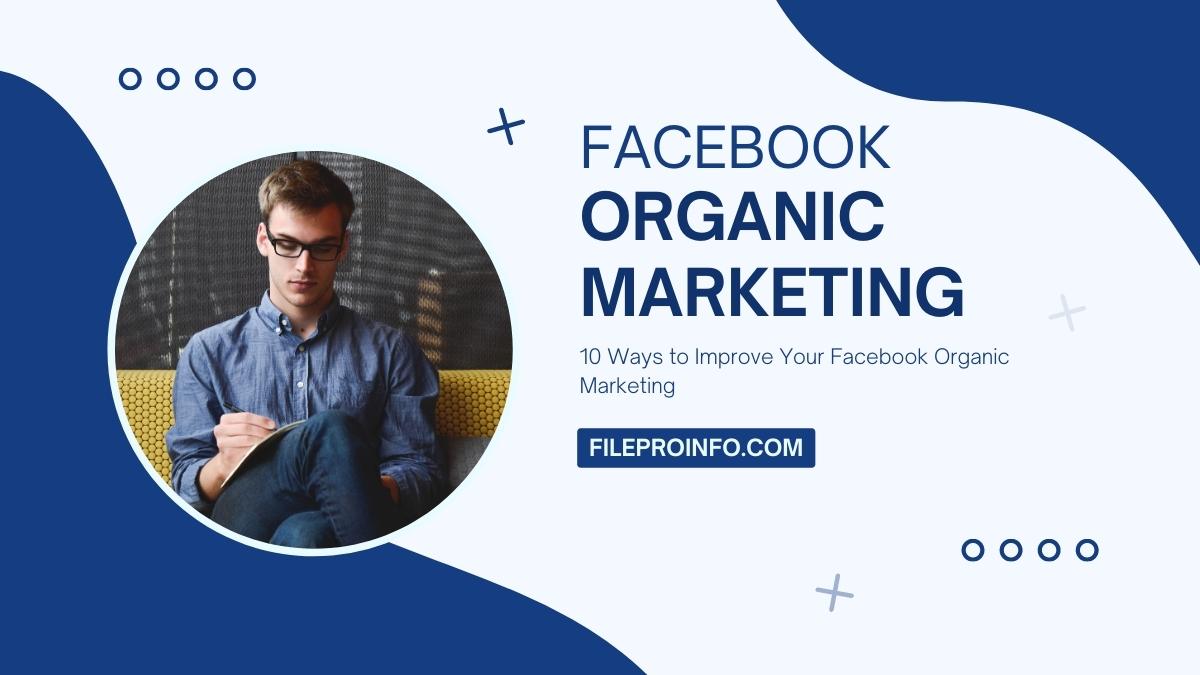
Facebook is one of the most powerful and popular social media platforms available. It allows businesses to increase brand awareness and grow their customer base. But how can you maximize your organic reach when it comes to Facebook marketing? In this article, we’ll provide you with 10 ways to improve your Facebook organic marketing and get the results you desire.
1. Publish Content That Merits Sharing
Organic marketing on Facebook is a powerful tool for businesses that wish to extend their reach and generate more leads. Content that resonates with an audience and merits sharing can help spread brand awareness, attract new customers, and increase website traffic.
Knowing what type of content to post to Facebook to engage your followers and encourage them to share is essential for successful organic marketing campaigns. Quality content that is interesting and relevant will draw the attention of users, build relationships with them, and ultimately motivate them to take action. The key is finding the sweet spot between entertaining stories, educational information, useful tips or tricks, inspiring messages, industry updates, and behind-the-scenes looks at your business operations – all while staying true to your company’s mission statement.
2. Contribute to Facebook Groups
Are you looking to use Facebook groups as part of your organic marketing strategy? Contributing to different groups can be a great way to increase the visibility of your brand and build relationships with potential customers. Here are some tips for contributing and engaging in Facebook Groups.
First, it’s important to find the right group for your business. Look for active communities that have members who share interests or values related to your business. Once you identify the best group for you, join and introduce yourself. Make sure to read all rules before participating; many groups have guidelines about posting frequency and content types.
Next, actively contribute meaningfully by responding thoughtfully To questions & sharing helpful insights or stories related To topics that come up during conversations within the group.
3. Leverage the Unconnected Distribution Algorithm
Organic marketing on Facebook is a powerful tool for businesses to reach their customers, but the Unconnected Distribution Algorithm can take it a step further. This algorithm allows businesses to leverage their organic reach and make sure that each post reaches its intended audience. Rather than sending out one post across all users, the Unconnected Distribution Algorithm divides posts into smaller batches and targets these batches towards more specific user groups.
In practice, this means that businesses can create highly targeted posts that are tailored to different segments of their potential customer base. By using this algorithm, companies can ensure that their posts resonate with each segment in turn, increasing engagement levels and providing an improved user experience. Furthermore, by reaching more people with more relevant content, businesses can also optimize engagement rates and conversion rates from organic marketing campaigns on Facebook.
4. Double-Down on Content That Appeals to Page Followers
Content that appeals to page followers is one of the most important aspects of successful organic Facebook marketing. To get the most out of your Facebook presence, you must create content that resonates with your audience and encourages them to interact with your posts. Investing in content that will appeal to your followers can provide a great return on investment (ROI).
The best way to build an engaged audience on Facebook is by creating content that resonates with them. Whether it’s providing helpful advice or humorous commentary, you should double down on creating materials that are interesting and relevant for your target market. Additionally, be sure to consider what type of photos, videos, and graphics capture their attention and make an impact. Posting engaging visuals will increase exposure for both new and existing content alike.
5. Limit External Links
Organic marketing on Facebook has always been a great way to reach potential customers and increase brand awareness. However, when it comes to external links, companies should be aware of the potential risks associated with them. If not used correctly, external links can result in decreased organic traffic, a decrease in search engine ranking, lost sales opportunities, and even security issues. Here are some tips for limiting the use of external links on your Facebook page to maximize your organic marketing efforts.
First, understand that linking out to websites other than your own can direct users away from your page. By using internal links instead whenever possible, you can keep visitors engaged on your page longer and ensure they get the content they need without leaving Facebook’s platform.
6. Analyze Facebook’s Top-Performing Posts
Analyzing Facebook’s top-performing posts is essential for organic marketing success. By understanding the content, tactics, and strategies that work best on the platform, businesses can ensure their organic campaigns are optimized to reach their target audiences.
Facebook provides valuable insights on post-performance data in its Ads Manager tool. Businesses can use these metrics to gain a better understanding of what type of posts perform best with their followers and how they can tailor their content accordingly. By evaluating factors such as engagement rate, reach and impressions, marketers can determine which types of posts resonate most with their target audience. Additionally, by tracking competitors’ activity on Facebook, businesses can gain an even deeper insight into what works for them and apply those strategies to their campaigns for greater success.
7. Review Popular Pages and Competitor Strategies
Organic marketing on Facebook is an effective way to reach more people and create brand awareness. However, to be successful, it’s important to review popular pages and competitor strategies. By doing so, marketers can better understand the tactics used by others and develop a more impactful organic Facebook marketing strategy of their own.
The first step in this process involves researching successful companies that are using organic Facebook marketing. Analyzing their posts will give you insight into what works for them, such as post frequency, type of content used, hashtags included, and even how often they engage with followers. Additionally, take note of how their audience engages with the content – including likes, comments, and shares – as this can also provide valuable insights into what resonates best with your target audience.
8. Share Trending Content When Relevant
Organic Facebook marketing is one of the best ways to reach a larger audience and engage with them. It’s important, however, to make sure you’re sharing content that is both relevant and trending if you want to maximize your reach.
To start, it’s essential to stay up-to-date on industry trends so that you can post content when it is most timely. You can follow industry news sources, look for popular hashtags on social media platforms or join in conversations happening on other pages and profiles. Get creative with what types of content you use — think videos, articles, polls, or memes — as this will help keep people engaged.
9. Split-Test Posts to Find What Works
Posting on Facebook is a great way for businesses to connect with their customers and drive organic growth. But, understanding what type of content resonates with your audience can be difficult. Split-testing posts on Facebook is an effective way to determine which type of post works best for you and your business.
Split-testing, also known as A/B testing, involves creating two different versions of the same post and running them simultaneously across a similar target audience. This allows you to compare the results between the two different versions, making it easy to identify which post was more successful in driving engagement or website visits. However, it’s important that when split-testing posts you make sure that only one aspect of the post is changed (e.g., image or headline).
10. Avoid Problematic Content
When it comes to organic marketing on Facebook, avoiding problematic content is a must. Not only can this type of content hurt the success of your campaigns, but it can also lead to backlash from customers and other stakeholders. To ensure your organic Facebook marketing strategy achieves its desired results, here are some tips for avoiding problematic content.
Firstly, be mindful of trending topics and avoid sharing posts related to them without careful consideration. Many organizations have faced public outcry for weighing in on controversial topics without fully understanding their implications. Additionally, certain topics may not be appropriate for all audiences; think twice before discussing them in any form.
Secondly, always make sure you review the contents of external links before sharing them via organic marketing channels such as Facebook.




